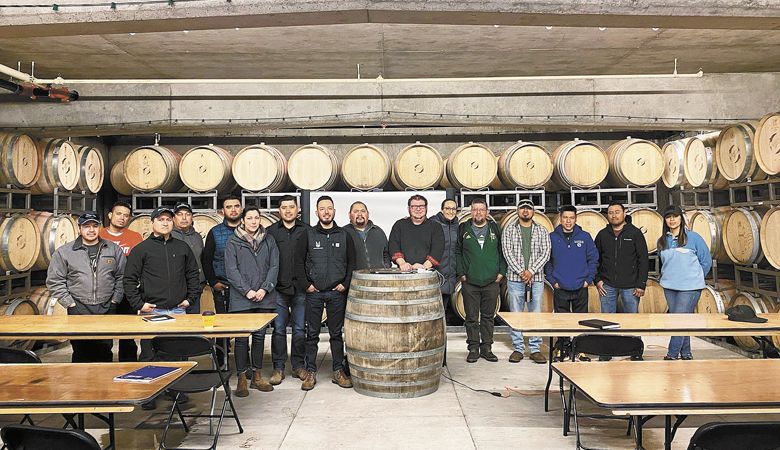AHIVOY Presses On
Hispanic group raises funds for education
Less than two months after AHIVOY’s wine industry professional training began, it was abruptly paused on March 13, with one week left in the first term, when the coronavirus forced the closing of Chemeketa Community College in Salem. In the interim, planning and fundraising have continued in the manner that evidences the determination and resilience that has characterized the Asociacion Hispana en la Industria Vinicola de Oregon since its inception less than two years ago. In addition, AHIVOY has been increasing the awareness in the Oregon wine industry of the benefits of the training for their vineyard stewards, the suitable designation adopted for the participants.
Jessica Sandrock, a member of the education committee and coordinator of programs and grants, wrote in an e-mail: “All students are expected to return. Eleven vineyard stewards started the program in 2020. Ten will be able to complete the program. We are sad to share that one of the students, Ben Hernandez (Lange Winery) lost his battle with cancer and passed away in August.” When I spoke with him on the first day of class in January, Hernandez had said he wanted to become a manager.
During a Zoom update session in October, Sandrock mentioned, “According to employers [of the participants]…the general consensus was that all of the vineyard stewards were eager to get back and finish the program...” In addition, the employers asked the organizers to “consolidate the program a little bit to meet the seasonal needs of when work ramps up.”
Montinore reported that its two participants have already stepped up to more responsibility. After speaking with some of the students, AHIVOY co-founder Sofía Torres-McKayof Cramoisi Vineyard noted, “All of them have…very positive feedback. They want to go back. They are also thinking about what they can do after…” If all goes as planned, the first cohort will return in person Jan. 13, 2021 — picking up from where it had left off — and end March 3.
During the last weekend of September, the organization held its first online auction. AHIVOY president DeAnna Ornelas of Winderlea Vineyard & Winery reported 117 folks from around the West registered to bid on 36 donated lots, which included wine packages, private virtual tastings, two-night getaway vineyard stays, and tours of two American Viticultural Areas. The auction raised $18,000. “We wanted to give the bidders an opportunity to learn, to give them wine learning experiences, not just give them wine,” Torres-McKay explained. “Our goal is to bring people to the Valley and [have them] get to know the people who are making wines, the vineyards, who’s in the frontlines.” AHIVOY wants to “do something good not just for our vineyard stewards but also for our donors,” she emphasized.
With revenue from the auction and other donations, there are enough funds to cover scholarships for the second cohort, says Sandrock. Because the staff members are volunteers, less than 5% of the budget — a remarkably small percentage — goes to administration, operations, business expenses and specialized contractor fees.
The second cohort is being recruited and will include at least one woman. In her e-mail, Sandrock stated, “There are nine interested students right now. However, AHIVOY is still accepting applications, and we encourage vineyard stewards and employers to turn in applications at their earliest convenience.” There will be an orientation after harvest for new students and employers. The 2021 cohort will start their studies Jan. 12 and complete the program April 27. AHIVOY can award 11 scholarships for this new group. “The limited number of scholarships this year is so we can meet social distancing requirements in place at campuses where most classes will take place,” Sandrock explained.
Rich Schmidt, director of Linfield University Archives and Resource Sharing, and member of AHIVOY educational committee, told of a parallel effort predating the formation of the association to do bilingual interviews of 25 to 30 vineyard workers and perhaps assemble them into a short documentary. Sandrock added that through Greg Jones, director of the Linfield University Evenstad Center for Wine Education, and Bree Stock, a WSET Level I instructor, will be included in the second-term curriculum of the wine industry professional training, with Stock donating her time to teach. Also, Chemeketa is “attaching continuing education units to the program,” which will automatically convert to credits for the introductory courses at the college and are transferable to the wine studies program at Linfield, OSU and Umpqua Community College.
AHIVOY serves as an excellent example for any unrepresented group seeking to increase participation in an industry. It brilliantly balances individual initiative with community support to expose participants to the widest range of options and begin their preparation to assume new roles. It is an organization worth cloning. As Schmidt noted: “[AHIVOY] speaks to Oregon again being a trailblazer… in the industry. No doubt…other [wine regions] will look at this as a model.”
To learn more or donate, visit www.ahivoyoregon.org.











